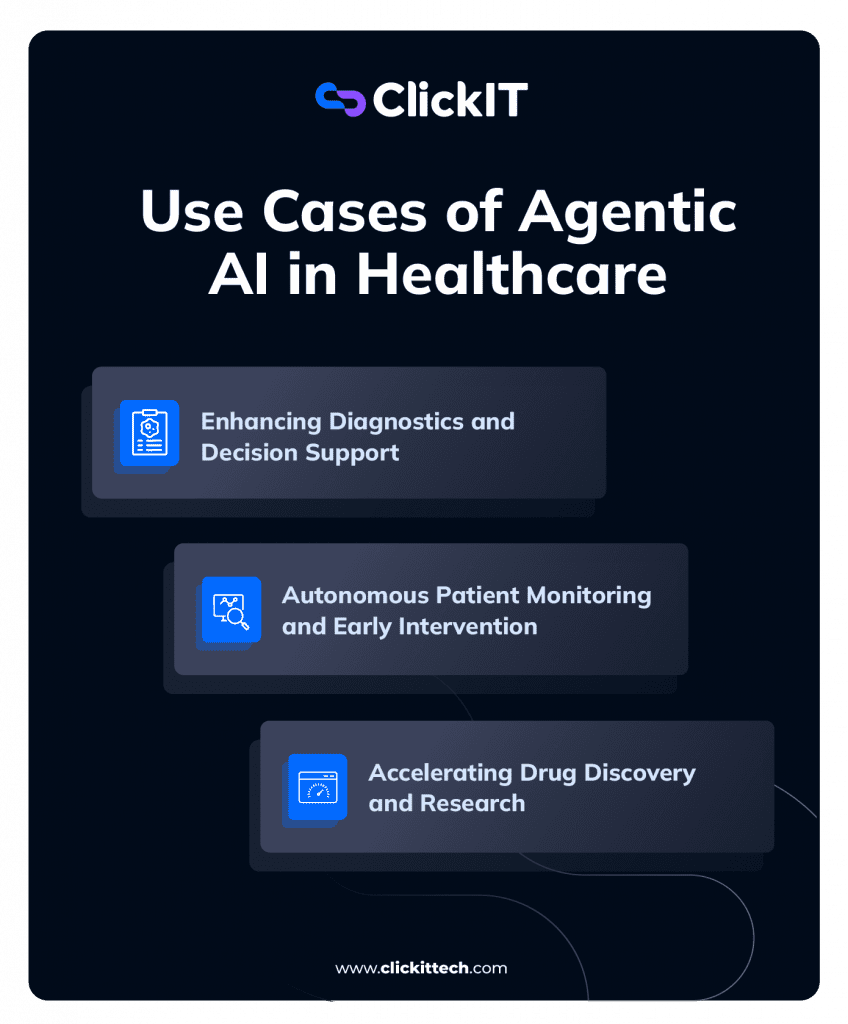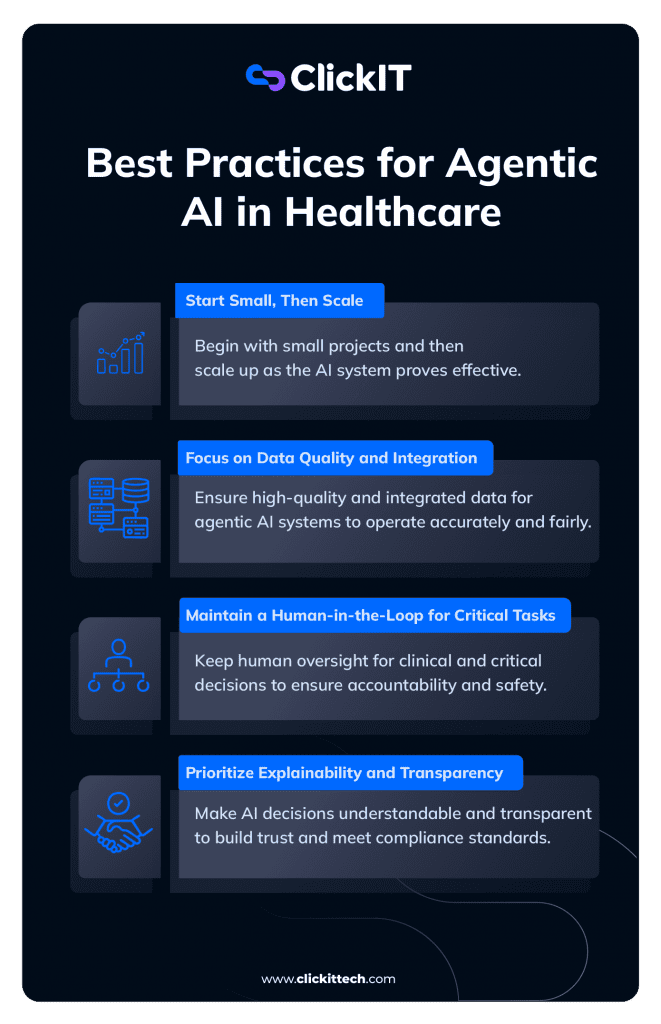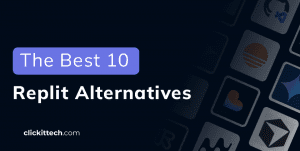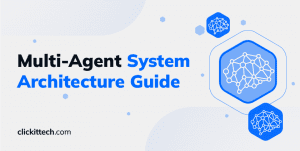Agentic AI refers to autonomous AI agents that can reason and take action with minimal oversight. In healthcare, these agents are already improving patient monitoring, diagnostics, drug discovery, and personalized treatment.
This post outlines five impactful AI in healthcare examples for 2025, along with best practices (starting small, ensuring data quality, and keeping humans in the loop) and notes on ethics and compliance. Healthcare leaders will learn how agentic AI is revolutionizing care and how to implement these technologies responsibly.
Partnering with skilled nearshore AI developers can also accelerate development and ensure adherence to compliance standards. By leveraging these strategies, healthcare leaders can harness AI’s full potential to improve patient outcomes and operational efficiency.
- How can AI agents assist with patient monitoring and early intervention?
- How do AI agents improve diagnostics and clinical decision support?
- 3. Autonomous Patient Monitoring and Early Intervention
- 4. Accelerating Drug Discovery and Research
- How are AI agents enabling precision medicine and personalized treatment?
- Best Practices for AI in Healthcare
- Ethical and Regulatory Considerations for AI in Healthcare
- Why Choose an AI Nearshore Partner for Healthcare?
- FAQs About AI in Healthcare

How can AI agents assist with patient monitoring and early intervention?
AI agents in patient monitoring act as 24/7 watchers that autonomously track vital signs and intervene (e.g., alerting doctors or scheduling care) before human providers even detect an issue
Example: A patient recently discharged from surgery wears a connected device that tracks vital signs, such as heart rate, blood pressure, or glucose levels. When the AI agent detects a risk, say, a spike in temperature or abnormal heartbeat, it doesn’t just alert the care team. It can:
- Schedule a telehealth consult
- Notify the primary physician
- Trigger medication reminders
All of this happens without manual intervention.
These agents are potent for chronic condition management (e.g., diabetes, heart disease), where early action can prevent ER visits.
In one real-world deployment, wearable AI agents reduced hospital readmissions by 40% through continuous monitoring and automated response.
The result? Fewer complications, lower costs, and more time for providers to focus on critical care, not logistics.
How do AI agents improve diagnostics and clinical decision support?
Another example of AI in healthcare is clinical decision support.
Imagine a patient arriving at the ER with chest pain. An AI agent instantly retrieves data from multiple sources, including electronic medical records, lab results, and radiology images. It synthesizes this information, runs predictive models, and identifies likely diagnoses and treatment paths.
What makes this agentic is its ability to act autonomously:
- It schedules a heart ultrasound,
- alerts the on-call cardiologist, and
- prepares the ER team, all without human prompting.
In one real-world example, an AI agent reviewing radiology scans detected early-stage tumors missed by clinicians. It not only flagged the findings but also:
- Recommended follow-up testing,
- Scheduled a biopsy, and
- Notified the care team, ensuring no delay in the workflow.
3. Autonomous Patient Monitoring and Early Intervention
Agentic AI systems enable continuous, proactive patient care by detecting early warning signs and initiating timely interventions, both in hospitals and at home.
AI in healthcare Examples:
- Diabetes Management with Livongo:
Livongo’s digital health platform utilizes agentic AI to continuously monitor glucose readings, diet, and activity. When blood sugar levels trend dangerously low, the AI agent automatically sends real-time alerts and suggests personalized actions, such as recommending a snack, without requiring human review. - ICU Monitoring with Philips IntelliVue Guardian:
In intensive care units, Philips’ AI system analyzes real-time patient data to predict critical events. When thresholds are crossed, it immediately alerts medical staff, enabling faster response times and reducing ICU mortality.
Across various settings, these autonomous agents serve as 24/7 health sentinels, detecting anomalies, notifying providers, and adjusting care plans in real-time, thereby preventing complications before they escalate.
4. Accelerating Drug Discovery and Research
Agentic AI accelerates pharmaceutical research by autonomously exploring data, generating hypotheses, and proposing drug candidates, dramatically reducing timelines and costs.
Example: Insilico Medicine
In 2024, Insilico Medicine’s AI platform used autonomous agents to:
- Identify a novel drug target for pulmonary fibrosis.
- Design new molecular compounds, and
- Deliver a drug candidate in just 18 months (a process that traditionally takes years).
This marked one of the first end-to-end examples of agentic AI in real-world drug development.
What Can These AI Agents Do?
AI agents in healthcare R&D can:
- Scan thousands of research papers and patient records to detect patterns or biomarkers,
- Generate hypotheses for treatment approaches,
- Design smarter clinical trials, and
- Monitor post-launch drug safety, all with minimal human input.
Read our blog about the best AI Agents Use cases for Business
How are AI agents enabling precision medicine and personalized treatment?
Here is another example of AI in healthcare:
Example:
Imagine a cancer patient receiving a treatment recommendation not based on a generic treatment plan for their condition, but instead tailored to their specific genetic mutations and clinical history. The AI agent might suggest an experimental drug or a combination therapy that has proven effective for patients with similar genetic markers, potentially saving months or even years of trial and error.
What makes agentic AI even more powerful here is that it doesn’t just provide recommendations, it can actively help guide treatment decisions.
After treatment begins, the AI agent can monitor patient data in real-time, adjusting the course of therapy as necessary.
For instance, if a patient’s tumor markers rise unexpectedly, the AI can recommend an alternative drug regimen based on real-time genomic data and analysis of the patient’s treatment history.
It’s like having a personal oncologist constantly reviewing the patient’s health data and proactively adjusting care in real-time.
Key benefits of AI in precision medicine include:
- Real-time updates on treatment efficacy.
- Individualized drug regimens based on a patient’s unique genetic profile.
- Faster adaptation to emerging evidence in clinical trials and medical research.
In sum, AI-powered precision medicine is opening new doors for more effective and individualized care, enhancing the ability to personalize treatment plans based on each patient’s unique needs.
Best Practices for AI in Healthcare
Here are a few best practices so you can implement AI in a healthcare solution with success:
- Start Small, then scale
- Focus on data quality and integration
- Maintaining a human in the loop
- Prioritize explainability and transparency

Start Small, Then Scale
A practical strategy for hospital executives and product managers is to begin with targeted pilot projects. Identify a high-impact area that is relatively low-risk (for example, automating appointment scheduling or insurance verification) to deploy an AI agent and prove its value. This aligns with expert advice to demonstrate success in a controlled domain and then scale up.
Early wins build internal confidence and help refine the technology under real-world conditions. Once the kinks are worked out and ROI is evident, you can expand agentic AI into more critical workflows.
Focus on Data Quality and Integration
Healthcare data can be messy, siloed, and governed by strict privacy rules. Investing in robust data integration, such as using interoperable APIs and data lakes, is essential so that your AI agents have a 360-degree view of the information they need.
Moreover, it ensures the data is representative and unbiased; if an AI learns from historical records lacking diversity, it could perpetuate biases in its autonomous decisions. Interdisciplinary teams of clinicians and data scientists should work together to curate training data and validate AI outputs for quality and fairness.

Maintain a Human-in-the-Loop for Critical Tasks
Regardless of how autonomous an AI agent is, healthcare providers should maintain human oversight for clinical applications, particularly when it comes to patient care. This doesn’t mean stifling the AI’s autonomy but rather setting up checkpoints or alerts that a clinician can review.
For example, an AI that drafts treatment plans should have a physician approve the final plan, or a diagnostic agent flagging an unusual finding should present an explanation for a radiologist to verify.
Human judgment remains the ultimate backstop for now, and the best agentic AI systems are designed to complement, not replace, human decision-making. Establishing clear protocols for when and how humans intervene if an AI’s recommendation seems off is crucial. Over time, as trust in the AI grows, these protocols can be adjusted; however, keeping clinicians engaged ensures accountability and safety.
Prioritize Explainability and Transparency
How an AI agent arrives at its actions is as important as the actions themselves, especially to win buy-in from healthcare professionals. Physicians and nurses are far more likely to trust and adopt an AI assistant if it can explain its reasoning in understandable terms (e.g., highlighting the patient data points that led it to issue a sepsis alert)
Engineers should incorporate explainable AI techniques, such as attention maps for images or audit trails for decisions, so that each recommendation or action by the agent can be traced and understood. This transparency is also crucial for compliance, as regulators may soon require documentation on AI decision-making processes for approval in clinical settings.
In summary, explainability should be treated as a core feature, not an afterthought, when developing agentic AI for healthcare.
Ethical and Regulatory Considerations for AI in Healthcare
Patient Data Privacy & Security
Agents often access sensitive health records (PHI). Systems must enforce strict HIPAA/GDPR compliance, for example, encryption, audit logs, and access controls to prevent leaks. For instance, one study notes that agents must be blocked from unrelated private data (like personal emails) even if they can access an EMR.
Bias and Fairness
AI models can inherit biases from training data. Healthcare agents must be rigorously tested to ensure equitable care across demographics. Transparency is critical: clinicians should understand why an agent made a recommendation (auditable “chain-of-thought”) to trust it
Human Oversight
Autonomous action requires accountability. Always define clear roles for human intervention, for example, a nurse reviews any critical alert before acting. The agentic AI should have “human-in-the-loop” checkpoints for high-risk tasks.
Regulatory Compliance
Governments are beginning to regulate healthcare AI. The EU’s upcoming AI Act will classify healthcare AI as high-risk, mandating transparency, documentation, and human oversight. In the US, FDA regulates clinical AI tools as medical devices; any agent used in diagnosis or treatment decisions may require FDA clearance.
Ensure security with our HIPAA Compliance Implementation
Ethical Use
Issues like consent, patient autonomy, and liability must be addressed. For example, clarify to patients when they are interacting with an AI (vs. a human). Establish policies on data usage, and plan for continuous monitoring of the AI’s performance to catch errors early.
Implementation Advice: Devote a section to ethics/regulation in the post. Cite legal perspectives that highlight “significant risks” around biased data and compliance. Emphasize best practices (data governance, bias audits, encryption) and reassure readers by pointing to resources.
Why Choose an AI Nearshore Partner for Healthcare?
Now that you have discovered some of the best AI in Healthcare examples, let’s talk about how Healthcare CIOs and innovation officers should consider partnering with experienced AI developers in LATAM or other nearshore regions to augment their internal teams.
These partners can bring technical skills and practical experience from similar projects. By leveraging a nearshore team, you gain flexibility and can scale the development effort quickly and cost-effectively as the project scope expands, without incurring lengthy hiring delays. Today, many successful healthcare AI products are built by distributed teams that combine local clinical insight with nearshore engineering talent.
This model lets you iterate faster and stay competitive with more prominent players. The key is to vet nearshore vendors for strong healthcare domain knowledge, proven security practices, and references from health industry clients to ensure they meet the bar for quality and compliance.
Those who invest early by partnering with skilled nearshore AI developers to jumpstart projects or pilot AI agents in key service lines stand to gain a serious competitive edge.
Empower your Healthcare app with our LATAM AI experts! Book a Free Call
FAQs About AI in Healthcare
AI in healthcare examples include AI-driven patient monitoring systems that track vital signs and alert providers, clinical decision support tools that analyze medical data to assist diagnoses, and automated administrative processes like AI-based scheduling that reduce paperwork.
Other notable examples are precision medicine algorithms that tailor treatments to individual patients and machine learning models used in drug discovery to identify new therapies faster
-Improved accuracy in diagnostics and early disease detection.
-Faster patient care through real-time AI-driven decision-making.
-Reduced workload and burnout for healthcare professionals.
-Lower operational costs by automating administrative and logistical tasks.
-Enhanced patient outcomes through predictive analytics and personalized treatments.
-Regulatory compliance: AI decisions must adhere to strict healthcare regulations (e.g., HIPAA, GDPR).
-Data integration: AI systems must access and process patient data from multiple sources (EHRs, lab reports, etc.).
-Trust and transparency: Physicians and patients need explainability in AI-driven decisions.
-Security risks: AI agents handling sensitive patient data must have robust cybersecurity measures.
-Human oversight: Critical healthcare decisions still require a human-in-the-loop approach to ensure safety.






